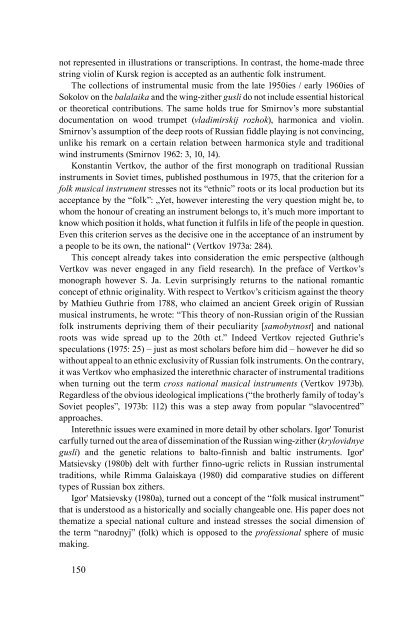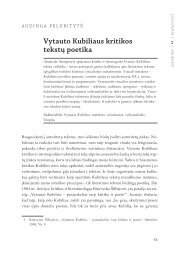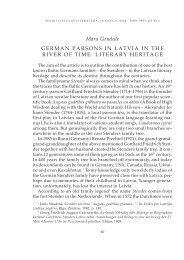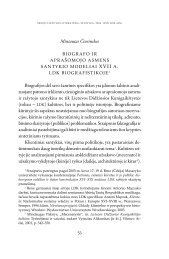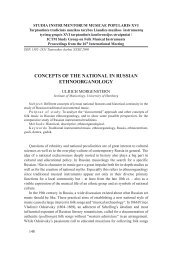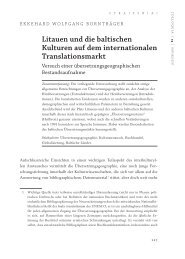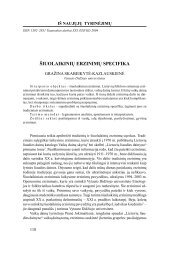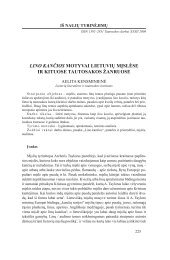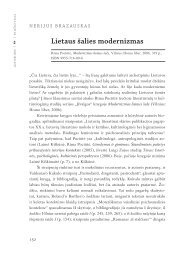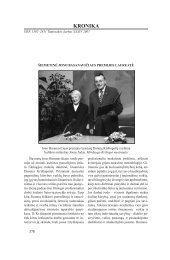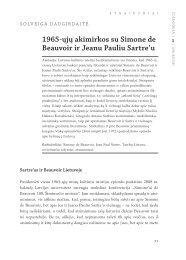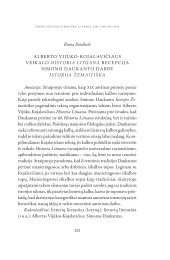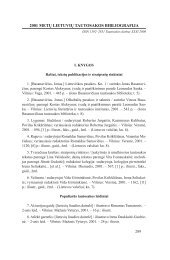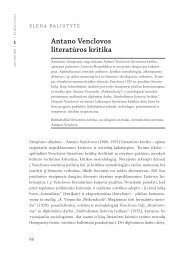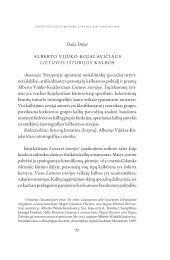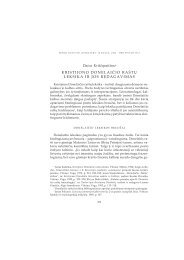- Page 1 and 2:
TauTosakos darbai XXXii Folklore sT
- Page 3 and 4:
ISSN 1392-2831 T A U T O S A K O S
- Page 5 and 6:
TURINYS / CONTENTS ISSN 1392-2831 T
- Page 7 and 8:
tautinių MažuMų tautosaka / Folk
- Page 9 and 10:
PRATARMĖ ISSN 1392-2831 Tautosakos
- Page 11 and 12:
įrašais seriją „1935-1941 met
- Page 13 and 14:
i.e. folk musical instruments of th
- Page 15 and 16:
STUDIA INSTRUMENTORUM MUSICAE POPUL
- Page 17 and 18:
and professional violinists living
- Page 19 and 20:
Hardanger fiddle tunes as played by
- Page 21 and 22:
The Hardanger Fiddle Concerto it wa
- Page 23 and 24:
Magnar Åm (b. 1952) wrote two piec
- Page 25 and 26:
XiX amžiaus antrojoje pusėje jau
- Page 27 and 28:
Pembroke Folk and Cultural Performe
- Page 29 and 30:
Engagements example 2. Come Let Meh
- Page 31 and 32:
tambrin Band from Mont st. george.
- Page 33 and 34:
predominantly perform today, one pi
- Page 35 and 36:
„SENESNI ŽMONĖS GRIEŽDAVO NEPA
- Page 37 and 38:
european colonisation in the 19th c
- Page 39 and 40:
Fig. 6a. stopped bol flutes partial
- Page 41 and 42:
in the traditional music of the Ber
- Page 43 and 44:
the musical notation in figure 9 sh
- Page 45 and 46:
NoTes 1 the east african region geo
- Page 47 and 48:
aPPeNdiX LIST OF AEROPHONE ENSEMBLE
- Page 49 and 50:
No. ensemble gauta 2006-05-12 class
- Page 51 and 52:
as in the case of Malaysia, islam i
- Page 53 and 54:
on the opposite sides of the belly
- Page 55 and 56:
oadens towards the belly and a prot
- Page 57 and 58:
Fig. 3. tuning of the gambus Melayu
- Page 59 and 60:
in the Malaysian context, the gambu
- Page 61 and 62:
oman, gabusi or gambusi in the Como
- Page 63 and 64:
modal structure of the taksim. the
- Page 65 and 66:
LIAUDIŠKA LIUTNIA (GAMBUS) IR SIMB
- Page 67 and 68:
and what is a vietnamese musical in
- Page 69 and 70:
sound and playing technique Playing
- Page 71 and 72:
at the homepage of the vietnam nati
- Page 73 and 74:
it can also be stated that traditio
- Page 75 and 76:
eFereNCes arana, Miranda (1999). Ne
- Page 77 and 78:
STUDIA INSTRUMENTORUM MUSICAE POPUL
- Page 79 and 80:
and manuscripts. He revealed to me
- Page 81 and 82:
told him that i can play it and tha
- Page 83 and 84:
now we can compare the traditional
- Page 85 and 86:
SARDINIJOS ORAS LAOSO DŪDELĖSE Gi
- Page 87 and 88:
The Origin of the Fujara the fujara
- Page 89 and 90:
a s y m b o l o f h i g h w a y m e
- Page 91 and 92:
a s s o c i a t i o n o f t h e f u
- Page 93 and 94:
Conclusions today, for slovak folk
- Page 95 and 96:
STUDIA INSTRUMENTORUM MUSICAE POPUL
- Page 97 and 98:
t h e s y m b o l i c c o n t e n t
- Page 99 and 100: Harmonier’s tricks in the adyghe
- Page 101 and 102: Harmonier Yury nagoev. Photo: Alla
- Page 103 and 104: scheme 1. traditional dancing circl
- Page 105 and 106: STUDIA INSTRUMENTORUM MUSICAE POPUL
- Page 107 and 108: 1. apotropaic: for driving out demo
- Page 109 and 110: god would allow lightning to strike
- Page 111 and 112: Fig. 2. Baptism of the bell. Photo:
- Page 113 and 114: songs with rhythmic text or singing
- Page 115 and 116: 7 rhythmic bell chiming is a form o
- Page 117 and 118: STUDIA INSTRUMENTORUM MUSICAE POPUL
- Page 119 and 120: even if they do not have a striker.
- Page 121 and 122: Archaeological and Cultural Context
- Page 123 and 124: variant pendants: bells, crosses, c
- Page 125 and 126: VARPELIAI, VARPAI IR VARPELIŲ PAVI
- Page 127 and 128: i established that this custom was
- Page 129 and 130: uilt after 1355 by the archbishop J
- Page 131 and 132: - a kettledrummer was chosen by a l
- Page 133 and 134: Łowicz, Łowicz distr. słupia, sk
- Page 135 and 136: Conclusions descriptions presented
- Page 137 and 138: LITAURŲ MUŠIMO TRADICIJA PER EUCH
- Page 139 and 140: there is practically no knowledge a
- Page 141 and 142: the museumisation of objects unites
- Page 143 and 144: process. Leif eriksson had already
- Page 145 and 146: a matter of re-staging, not de-stag
- Page 147 and 148: Lindvall, karin (1999). Musealiseri
- Page 149: focuses on the contemporary folk mu
- Page 153 and 154: musical instruments in russia were
- Page 155 and 156: ukraine, but also with the lute mus
- Page 157 and 158: weighting of the weak beats, gives
- Page 159 and 160: galaiskaia, r. B. (1980). Опыт
- Page 161 and 162: IŠ NAUJŲ TYRINĖJIMŲ MIRTIS IR L
- Page 163 and 164: Jokimaitienė taip nusako į tokias
- Page 165 and 166: kaimynai, kelionei (dažniausiai ik
- Page 167 and 168: Žemė drebėjo Ltr 3999(36); Ten t
- Page 169 and 170: akivaizdu, kad kulkos-bitės folklo
- Page 171 and 172: gaus veikla, prilygsta neįgyvendin
- Page 173 and 174: ūsi tradiciškai, kaip ir kiti tav
- Page 175 and 176: siuos laukeliuos, Kur katras tik mi
- Page 177 and 178: vėlyvosiose karinėse-istorinėse
- Page 179 and 180: in the battlefield is subtly supple
- Page 181 and 182: nepriimtinus straipsnius spausdinę
- Page 183 and 184: vėjo, kad ryžosi ją atlikti. kla
- Page 185 and 186: Patriotiškas hiphopas Lietuviškas
- Page 187 and 188: ankstyvojo roko ir hiphopo muzikoje
- Page 189 and 190: IŠ NAUJŲ TYRINĖJIMŲ ISSN 1392-2
- Page 191 and 192: organizacijos ar jų padaliniai (dr
- Page 193 and 194: atkurtos organizacijos nemažą sav
- Page 195 and 196: Paskutinė vakarinio laužo daina -
- Page 197 and 198: Per kalendorines šventes - užgav
- Page 199 and 200: ties pavadinimą, jis turi būti in
- Page 201 and 202:
organizacijų galima rasti grupių
- Page 203 and 204:
IŠ NAUJŲ TYRINĖJIMŲ ISSN 1392-2
- Page 205 and 206:
priešakyje. Bosiniu strykiniu chor
- Page 207 and 208:
„yra skambinęs keletą kartų pe
- Page 209 and 210:
evaldas vyčinas ir Jonas Lechovick
- Page 211 and 212:
mokymosi cimbolais būdą. uždengu
- Page 213 and 214:
30 ten pat, p. 75. 31 ten pat. 32 M
- Page 215 and 216:
aiškios gyvenimo pasakojimų fiksa
- Page 217 and 218:
gyvenimą pasakojo „atviru šird
- Page 219 and 220:
Apie folklorinius intarpus gyvenimo
- Page 221 and 222:
prigimties pateikėjų gyvenimo pas
- Page 223 and 224:
tomas venclova: „Folkloriniai rit
- Page 225 and 226:
IŠ NAUJŲ TYRINĖJIMŲ ISSN 1392-2
- Page 227 and 228:
mas ir mįslėje apie apynį: Vytur
- Page 229 and 230:
Augo augo žalias linas, Žydė žy
- Page 231 and 232:
Velnias ir sugalvojo įlįsti į li
- Page 233 and 234:
apie vargą: Vargas mums privinčia
- Page 235 and 236:
tūrą: Kai jaunas buvau, siūbavau
- Page 237 and 238:
liepia daryti tai, kas privalu: Su
- Page 239 and 240:
vaizduojami patiriantys smurtą. se
- Page 241 and 242:
clothing, dressing, covering of the
- Page 243 and 244:
pirmasis posmas - po melodijomis) i
- Page 245 and 246:
3. Ltr 2464(770). Miesca zapisu - p
- Page 247 and 248:
10. Ltr 2464(911). Miesca zapisu -
- Page 249 and 250:
16. Ltr 2464(765). Miesca zapisu -
- Page 251 and 252:
А я свайго мужыка с
- Page 253 and 254:
24. 1. a u poli vietryk bylinku ka
- Page 255 and 256:
Chłapcy: a my prosu wytapčym, wyt
- Page 257 and 258:
tojos minimų kultūrinių imperaty
- Page 259 and 260:
kapeliai virtę sunkiai pereinamu m
- Page 261 and 262:
aplinka), bet ir strategiškai pato
- Page 263 and 264:
4 žr. Mykolas Biržiška. anuo met
- Page 265 and 266:
vartojimo „kelius ir klystkelius
- Page 267 and 268:
SUKAKTYS ISSN 1392-2831 Tautosakos
- Page 269 and 270:
stropiai datuoja užrašus. Besišn
- Page 271 and 272:
SUKAKTYS ISSN 1392-2831 Tautosakos
- Page 273 and 274:
1907 m. rugpjūčio 18-19 d. buvo s
- Page 275 and 276:
Be pirmajame Lietuvių mokslo draug
- Page 277 and 278:
mokslų sričių tyrinėjimus“ 19
- Page 279 and 280:
pranešta, kad nario mokestį tesum
- Page 281 and 282:
tūros, vėliau - Lietuvių literat
- Page 283 and 284:
PRO MEMORIA ISSN 1392-2831 Tautosak
- Page 285 and 286:
„rinkime tautosaką!“ - tokiu p
- Page 287 and 288:
1943 m. jį uždarius, jas baigė p
- Page 289 and 290:
PRO MEMORIA ISSN 1392-2831 Tautosak
- Page 291 and 292:
Paskutinė išleista knyga - „Lie
- Page 293 and 294:
sią dvasinių mokslų instrumentą
- Page 295 and 296:
Folklore Fellows draugijos narys, d
- Page 297 and 298:
dėl leidyklos darbuotojų toliareg
- Page 299 and 300:
RECENZIJOS ISSN 1392-2831 Tautosako
- Page 301 and 302:
kai). dainos melodijoje gausu meliz
- Page 303 and 304:
nr. 1; „sausė lėnelē išdžiuo
- Page 305 and 306:
nepasirinktas vienodas melodijų sk
- Page 307 and 308:
Juozo Baldžiaus kultūrinio paliki
- Page 309 and 310:
nutrūkęs penkiasdešimčiai metų
- Page 311 and 312:
lorą, suformuluota 1936 metais Lie
- Page 313 and 314:
yškesniais folklorizmo pavyzdžiai
- Page 315 and 316:
grojimas ligavka per adventą kai k
- Page 317 and 318:
gistruoti visų aptiktų instrument
- Page 319 and 320:
ŠV. AGOTOS ŠVENTĖ ISPANIJOJE Ši
- Page 321 and 322:
je - iii a. sicilijoje krikščiony
- Page 323 and 324:
statė žymiausios didžiosios Brit
- Page 325 and 326:
abejo, atrodo gana kukliai šalia j
- Page 327 and 328:
estijos populiariojoje muzikoje: sk
- Page 329 and 330:
teto studentų praktikos darbų (va
- Page 331 and 332:
2004 METŲ LIETUVIŲ TAUTOSAKOS BIB
- Page 333 and 334:
22. iškasiu šulnelį: anelės Pra
- Page 335 and 336:
Tezės 45. international Ballad Com
- Page 337 and 338:
74. kavaliauskienė, aušra. Jaunų
- Page 339 and 340:
106. senvaitytė, dalia. ugnies die
- Page 341 and 342:
138. Buračas, Balys. Joninės //
- Page 343 and 344:
171. Penttinen, Yrjö. karo žinia
- Page 345 and 346:
205. žaidimai, rateliai, šokiai /
- Page 347 and 348:
238. Liugaitė, Modesta. on the alt
- Page 349 and 350:
255. Казанскене, Ванд
- Page 351 and 352:
278. Būgienė, Lina. - rec. kn.: F
- Page 353 and 354:
299. Profesoriaus stasio skrodenio
- Page 355 and 356:
330. Šidlauskas, aleksandras. Baly
- Page 357 and 358:
suTruMPiNiMai aLtM - Latviešu taut
- Page 359 and 360:
Mūsų autoriai vitas agurkis LLti
- Page 361 and 362:
Jurgita ūsaitYtė dr., LLti dainyn
- Page 363 and 364:
9 Sandra E. Trehub. the development


